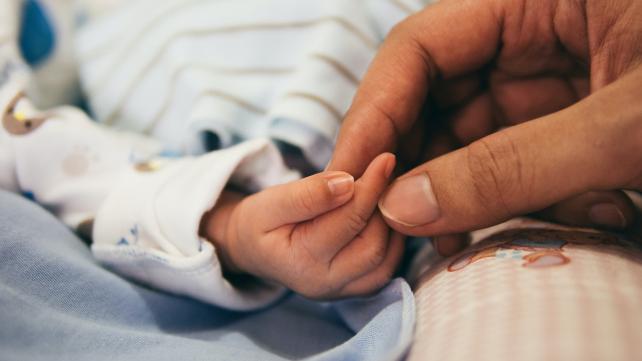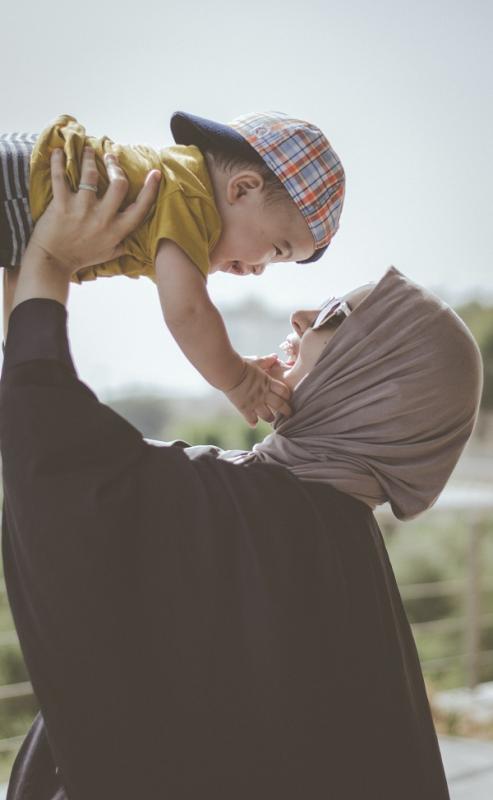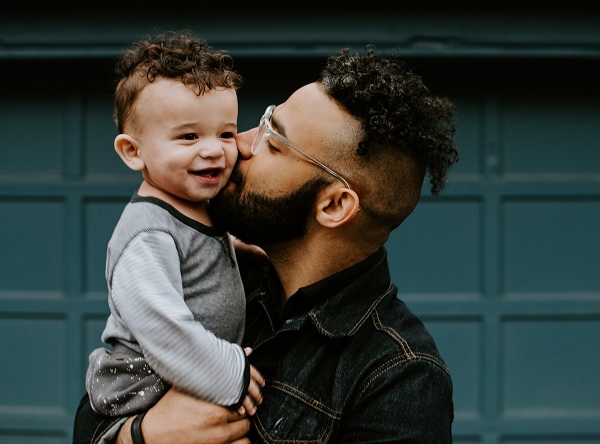
“Be grateful for your life, every detail of it, and your face will come to shine like a sun, and everyone who sees it will be made glad and peaceful.” (Rumi)
It’s easy to get lost in the drudgery of parenting. The endless to-dos, the places to be, the battles to pick. Some days you feel as if you’re on autopilot, going through the motions until bedtime when you finally get to switch your brain and body off for a while, just to wake up and do it again the next day. In moments like these, it’s hard to see the beauty or the purpose. It's hard to be grateful, but it’s also vital.
Shukr
Living a life of gratitude is a big part of being a Muslim. Allah mentions gratitude as one of the main purposes of our creation. We are reminded in the Quran:
“It is He Who brought you forth from the wombs of your mothers when you knew nothing; and He gave you hearing and sight and intelligence and affection: that you may give thanks (to Allah).”
(Surah an-Nahl, 16:78)
In Arabic, the word shukr, means to show gratitude for the favors or blessings that Allah gives us. We can show that gratitude to Him in one or a combination, of three ways:
- with our tongue (i.e., saying ‘thank you’)
- with our body (i.e., an action of gratitude)
- with our heart (i.e., feeling grateful inside)
Showing gratitude is so important that Allah even mentions it in the Quran as a characteristic of those who truly worship Him,
“... and be grateful to Allah, if it is Him you worship.”
(Surah al-Baqarah, 2:172)
But what does this have to do with parenting our children?
We Are for Our Children
Stop for a minute, close your eyes, and imagine what your life would be like if you never had children. Where would you be? What would you be doing? Who would you have become?
Can you picture it? I can’t. I simply cannot imagine my life without my children in it.
I like to believe it’s because my specific children, each and every one of them, were created just for me and I was created just for them. My unique family, my parenting journey, who I have become as a mother, has all been meticulously and lovingly designed by the All Wise and Most Merciful.

I didn’t pick my children, Allah did.
“It is He who forms you in the wombs however He wills. There is no deity except Him, the Exalted in Might, the Wise.”
(Surah al-’Imran, 3:6)
I wasn’t the one who allowed my body to carry a child, Allah did.
“... We created you from dust, then from a sperm-drop, then from a clinging clot, and then from a lump of flesh, formed and unformed—that We may show you. And We settle in the wombs whom We will for a specified term, then We bring you out as a child, and then [We develop you] that you may reach your [time of] maturity ….”
(Surah Al-Hajj, 22:5)
Isn’t this something worth being grateful for? Knowing that Allah chose us to be the parent to our specific children? He could have chosen someone else, but in all His Knowledge and Wisdom, He chose YOU. He chose me. Alhamdulilah, all praise and blessings are for Allah alone.
A Grateful Mindset
Parenting is hard. I have found inspiration from Shahnila Ahmad, parent mentor and founder of Brave Muslim Parents on Instagram. She sat down with me to talk about a gratitude mindset and the advice is profound.
“Gratitude has everything to do with what we want as a parent. Whether it’s happiness, contentment, whether we don’t want to feel overwhelmed or we want to find joy in our parenting, whatever our goals are in parenting, we can’t achieve them without gratefulness.”
“When we’re grateful, for the good and the bad, it serves a purpose. Everything that Allah does, it’s for a reason. So the kids that He gave us, it was for a reason. The way they trigger us, that was intentional. And so the mindset of a parent when we are filled with gratitude for all that Allah gave us, and then we accept it, we’re accepting everything, knowing that Allah says:
‘… If you are grateful, I will give you more.’”
(Surah Ibrahim, 14:7)
“More what? It’s open. It could be whatever you want—His reward, more patience, the answers that you’re looking for.”
Of course, being grateful doesn’t mean that we have to maintain false positivity towards our life, relationships or that we cannot identify and address problems as they arise in our parenting journey. Quite the opposite in fact.
Being grateful allows us to take a step back from the immediate emotions of a situation and really get to the bottom of things.
“When we are grateful then we can be patient with ourselves and with the circumstances, and we can step back and be curious. When we’re curious, instead of feeling guilty and being hard on ourselves or having toxic positivity and always saying everything is okay, we can look at things objectively and be introspective,” says Ahmad.
Moving from Overwhelmed to Grateful
A common feeling for many parents, especially those who stay at home with the children and/ or take on the majority of the day-to-day care and responsibilities for the family, is one of overwhelm. Overwhelm is often coupled with feeling as if no one truly appreciates all that you do in your role as caretaker, head chef, teacher, chauffeur, maid, personal shopper, accountant, and so much more.
Many times we bottle these feelings inside, where they slowly build into frustration, anger or even resentment, and they sit waiting for the moment that something seemingly small happens (a dirty sock left out on the floor maybe?) and we finally explode.
But even in these times, Ahmad says, a grateful mindset can help us to recognize these moments for what they really are: a mirror into the deeper issues going on inside.
“When we have a grateful mindset, we can recognize that these moments are temporary and welcome our feelings of overwhelm. One of the greatest blessings of being a parent is not that we get to take care of a child, but it’s that our children show us our strengths and our weaknesses …. They show us what we need to work on so that we can become the best versions of ourselves. Instead of telling yourself that it’s all okay, you can be overwhelmed and ask yourself what’s really going on.”
Making Space for Gratitude
One strategy Ahmad recommends for frustration and anger is to do a brain dump.
When you’re feeling overwhelmed, jot down all the things that are bothering you. As you write, ask yourself “what else?” and keep on writing more things that are bothering you. Pretty soon you’ll uncover that the things you thought you were angry with about your children are mostly really about something else. Once you identify the root issues, then you can tackle them one by one.
Another strategy Ahmad suggests to move from overwhelmed, is to stop and name five things you’re grateful for. For example: a warm home, safety, healthy children, your eyesight or even your refrigerator.
“When things happen in the home, the refrigerator doesn’t work or the car breaks down, and you get by, you survive, later on you’ll realize that those things were lessons for you. So another part of gratitude is welcoming when life happens instead of resisting it,” says Ahmad.
Research has shown how adaptable the human brain is. Approaching our life with a growth mindset versus a fixed one allows our brain to learn, change and to grow. When we make space to remember all that we are grateful for, we are training our brain to be more grateful as our journey continues.
Bringing Gratitude into Hearts and Homes
In order to build an attitude of gratitude in your parenting and an environment of gratitude in your home, small steps taken consistently and as a family can help. Ideas to try include:
- Journaling
- Asking each other what you’re grateful for
- Keeping a gratitude jar or calendar
- Showing gratitude to one another regularly and consistently
- Reflecting on Allah’s creation around you
- Consistently reciting words of gratitude to Allah
“All these seeds that we’re planting and attaching to Allah, we are planting seeds of gratitude. And you don’t know which seed is going to become the big, huge oak tree for our kids that’s going to help keep them grounded in our faith,” reflects Ahmad.

Showing Gratitude to our Children
Sometimes, out of our love and concern for our children, we tend to zoom in on the “negative” aspects of our children's behavior and character more than the positive ones. And in trying to correct the perceived problem, we do a lot of telling our kids what to do and how to be.
But what message does this send to our children? That we are unhappy with them. That we don’t trust them to think through situations or make good choices. That we don’t really like who they are and want them to change.
So how do we change this? How do we use gratitude to shift our mindset and our responses surrounding the natural personalities and character traits that Allah bestowed in our children, even when they challenge us?
According to Ahmad, accepting who our children are is showing acceptance and gratitude to Allah for what He made and bestowed upon us. It is part of welcoming what Allah has chosen specifically for us on our unique journey.
“Allah created everybody with special gifts. Sometimes our children have gifts we don’t understand because we are not like that. But our job isn’t to make them into something that they’re not. Allah already created them; we don’t need to recreate them. Our job is to figure out what conditions we can provide to help our children become the best versions of themselves,” advises Ahmad.
“We have to find the good in our kids. We can name the bad things. But it takes us reflecting to see the positive qualities. Whatever we focus on grows. If you keep hearing how bad you are in math, it’s not going to inspire you to be better in math. That doesn’t help. They are not their bad behavior. It doesn’t define them, just like our yelling doesn’t define us as a mom. Instead of focusing on the symptom, find out what’s really going on. And then say Alhamdulilah for it.”
The Grateful Parent
Allah doesn’t need our thanks or gratitude. He is Self-Sufficient and Free of Need. But WE need to have gratitude for the benefit of our own lives and souls. Allah says in the Quran:
"Be grateful to Allah. And whoever is grateful, is grateful for [the benefit of] himself. And whoever denies [His favor]—then indeed, Allah is Free of Need and Praiseworthy.”
(Surah Luqman, 31:12)
Embodying gratitude in our parenting is a crucial part of us gaining benefit and blessings while we are on this journey. While we make these efforts, keep these three things to keep in mind:
1. Model gratitude.
“Modeling takes time but it puts the focus on us. The best way to teach children anything is by modeling. And just because you model, doesn’t mean that you’re entitled. It’s not our job to make them behave a certain way. What we are doing is simply nurturing the best in them,” says Ahmad.
2. Know that our children don’t belong to us.
“Our kids don’t belong to us. They belong to Allah and they’re going to return to Allah. We just have them for a little while. And we’re going to be held accountable. It’s Allah who is in charge. We can focus on our efforts but the end result is up to Allah. So you focus on what you can control which takes us back to modeling. Are we regulating our emotions? Are we in a space where we can be present? If not then those are indicators that something is off with us and we need to recalibrate and show up in a different way,” advises Ahmad.
3. Remember that all of this is temporary.
“Instead of saying ‘I have to’, I like to say ‘I get to.’ I don’t have a to-do list, I have an ‘I get to do list’ because you don’t know when the last time is going to be. You don’t know when the last time you’re going to hug your child will be. You don't know when the last time will be that you tuck your child in,” reflects Ahmad.
“Where does it say that Allah promises us that our kids are going to grow up?”
To read and listen to more about parenting from gratitude and other parenting reflections, follow Shahnila Ahmad @bravemuslimparents on Instagram.
Melissa Barreto is a home educating mother of five and Co-Founder of Wildflower Homeschool Collective, a homeschool organization based in Northern New Jersey.
Shahnila Ahmad is a Parent Mentor and Founder of Brave Muslim Parents on Instagram where she encourages parents to become the biggest influencers for their kids by “parenting from faith, not fear.”



Add new comment